

In Collaboration We Trust. Collaboration is the new way to work.
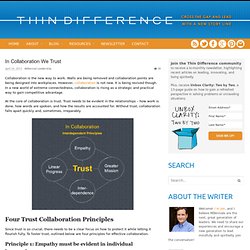
Walls are being removed and collaboration points are being designed into workplaces. However, collaboration is not new. It is being revived though. In a new world of extreme connectedness, collaboration is rising as a strategic and practical way to gain competitive advantage. At the core of collaboration is trust. Four Trust Collaboration Principles Since trust is so crucial, there needs to be a clear focus on how to protect it while letting it flourish fully. Principle 1: Empathy must be evident in individual interactions. Empathy is a funny word. For collaboration to work well, all involved need to demonstrate empathy in the way we listen, talk, and act.
More than building trust, empathy makes trust active. Principle 2: The group mission must be paramount above the individual objectives. Self-interest plays a role in many interactions. When self-interest is at the center, all breaks. Although trust starts at an individual level, it also ends here. Says the Vast Majority of Social Collaboration Initiatives Fail Due to Lack of Purpose. Egham, UK, April 2, 2013 View All Press Releases "Provide and Pray" Approach Has Just a 10 Percent Success Rate Gartner Analysts to Share Best Practices for Planning Social Collaboration at the Gartner Enterprise Architecture Summit 2013 in London, U.K. and National Harbor, Maryland, U.S.
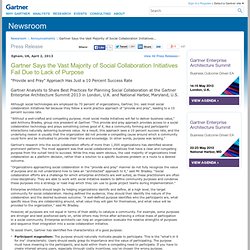
Although social technologies are employed by 70 percent of organizations, Gartner, Inc. said most social collaboration initiatives fail because they follow a worst practice approach of "provide and pray", leading to a 10 percent success rate. "Without a well-crafted and compelling purpose, most social media initiatives will fail to deliver business value," said Anthony Bradley, group vice president at Gartner. "This provide and pray approach provides access to a social collaboration technology and prays something comes good of it, like a community forming and participants' interactions naturally delivering business value. To assist them, Gartner has identified five characteristics of a good purpose: Social business and the changing theory of management. A manager recently voiced his concerns: “Most employees prefer being told what to do.
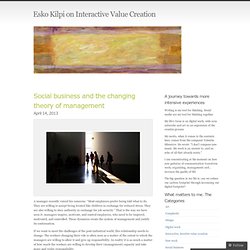
They are willing to accept being treated like children in exchange for reduced stress. They are also willing to obey authority in exchange for job security.” That is the way we have seen it: managers inspire, motivate, and control employees, who need to be inspired, motivated, and controlled. These dynamics create the system of management and justify its continuation. If we want to meet the challenges of the post-industrial world, this relationship needs to change.
The dysfunctional relationship between managers and employees creates a self-fulfilling prophecy and a systemic failure in creative, knowledge-based work. A few researchers have started to dispute the assumption that the present system of management is a fact of life that will always be with us. We need to learn how to connect. From danah boyd’s presentation at ASTD TechKnowledge 2013, on the future of work: But if you want to prepare people not just for the next job, but for the one after that, you need to help them think through the relationships they have and what they learn from the people around them.
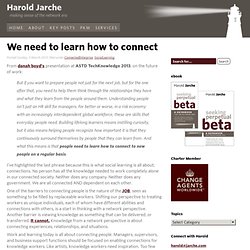
Understanding people isn’t just an HR skill for managers. For better or worse, in a risk economy with an increasingly interdependent global workforce, these are skills that everyday people need. Building lifelong learners means instilling curiosity, but it also means helping people recognize how important it is that they continuously surround themselves by people that they can learn from. And what this means is that people need to learn how to connect to new people on a regular basis. I’ve highlighted the last phrase because this is what social learning is all about; connections.
One of the barriers to connecting people is the nature of the JOB, seen as something to be filled by replaceable workers. Social Business News. April 17, 2014 Enterprise knowledge goes retail As social platforms create better pathways for knowledge exchange in the workplace, information, as a commodity, is evolving.
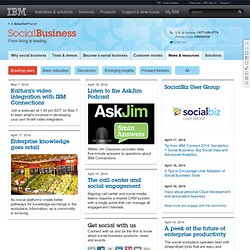
April 15, 2014 The call center and social engagement. Nilofer Merchant. 12 Principles of Collaboration. Hyperthinking. Enterprise 2.0 SUMMIT: Enabling the Social Enterprise (R)Evolution. Enterprise 2.0 Summit 2013 – Day 2. Enterprise 2.0 Summit 2013 in 5 keywords. The magnificent city of Paris received once again the Enterprise 2.0 Summit, one of the most important events on E2.0 and Social Business.
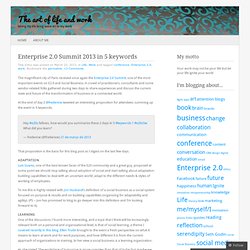
A crowd of practitioners, consultants and some vendor-related folks gathered during two days to share experiences and discuss the current state and future of the transformation of business in a connected world. At the end of day 2 @fredericw tweeted an interesting proposition for attendees: summing up the event in 5 keywords. Hey #e20s fellows, how would you summarize these 2 days in 5 #keywords ?
#e20s5w What did you learn? — fredericw (@fredericw) 21 de março de 2013 That proposition is the basis for this blog post as I digest on the last few days. Enterprise 2.0 Summit 2013 – Day 1. My Storify. Rawn Shah . Forbes. Jon Husband Wirearchy. #E20S Jon Husband on the future of work ~ HR to HR 2.0 and Human Capital (HCM) We're onto day 2 of the Enterprise 2.0 conference in Paris.
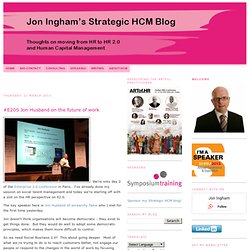
I've already done my session on social talent management and today we're starting off with a slot on the HR perspective on E2.0. The key speaker here is Jon Husband of wirearchy fame who I met for the first time yesterday. Jon doesn't think organisations will become democratic - they exist to get things done. Acting for Change. Organisations, Cultures, 21st Century. T. de Baillon.